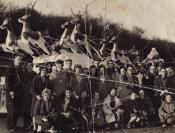Browse the interviews
Sorted by interview reference
VN053 Dilys Pritchard, Austin Taylor, Bethesda;Ferranti, Bangor
Dilys worked in Woolworths after leaving school for four years. She moved to Ferranti's, around 1961-1962, where she stayed for six months, before leaving to work at Austin Taylor. Almost straight away, she became one of their 'keyworkers' learning how to treat people and train them on the product. She remembers that one girl got her hair caught in one of the machines once and she had the wit to turn it off.They had to get scissors and cut some of her hair to get it free. After eight years, she became ill with appenicitis and had to leave. The factory told her that if she wanted her job back she'd have to go to a tribunal and, with no union to back her up, she lost her job in 1970.VSE053 Betty Probert, Hoover, Merthyr;OP Chocolate Factory, Merthyr
Betty left school at 16 (1946) and started in O P Chocolates (until 1954) with her twin sister. She was in the packing dept. Also helped in basement with the line, making chocolates or in the boiled sweets section. Heavy work. They also made wafer biscuits. You could eat as much as you wanted. They had broken biscuits in bags. Union supported her when she refused to do the heavy work. Records, talking and singing. Sending notes with chocolates ‘If married, pass us by, if single, please reply.’ Her sister met a man from Holland in this way! Dusting chocolates with feather duster. Factory moved to Dowlais. Lots of the girls moved to Hoover’s. Describes the different jobs she did there on washing machine. Training in London. All girls on assembly. She had an accident and compensation - £60 – before tribunal. Union – her friend was a shop steward. Monthly and Xmas bonuses. She had a washing machine, tumble drier and a cleaner (cheaper) when there. She can still have these today. Equal pay strike – women on big machines. Not aware of the Dagenham strike. Dancing in canteen and table tennis facilities. Sports Day – factories competing . Concerts – mentions singers. Smoking on factory floor. Holidays. Still meet up – cricket club. She left Hoover’s in 1989. Gold watch for 25th + £30; £100 for 35 years. Monthly pension and redundancy pay. ‘Home from ‘home’.VSW053 Meiryl James, Milk Marketing Board Creamery, Felinfach
Meiryl was 19 when she left school and she started working in the laboratory in the factory in 1957 – until 1968 (when she became pregnant). She mentions the overalls and the acid burns on them and on skin. She describes testing the milk and the smell of the milk from the different farms. The factory had to be open all year round. They had a lot of fun and she would compose verses for the Christmas party. She bought a car after 5 years and went to eisteddfodau. She won the Sydney Foster prize. She describes the problems in hot weather. They attended one another’s weddings to form a ‘guard of honour’.


VN054 Sandra Owen, AustinTaylor, Bethesda;High Speed Plastics, Llandygái
Sandra went into the plastics factory straight from school, in 1970, making watering cans and sun visors. They were doing time and motion, everyone had their targets, and wages depended on how many sunvisors a worker had made, so people were going full pelt in order to earn a high wage at the end of the week. After two years, she moved to Austin Taylor in Bethesda, where she was able to walk to work. The factory made electronic parts and she was on the machines, in the machine shop, and she said the machines were so big, you wanted to run straight back out again. But the men trained her and in a day or two she became 'a real boy' on the machine and very happy. The workers had targets to reach in this factory too and sometimes did a 56 hour week to reach them. Later Sandra became a supervisor. She stayed in this factory until it was about to close in 1998, when she left and started her own business, supplying chickens to butchers shops around Wales.VSE054 Doreen Lillian Maggie Bridges (nee Moses), Valeo, Ystrad Mynach;Golmets, Pontllan-ffraith;Switchgear, Pontllan-ffraith;Cora Crafts, Pengam
Doreen left school at 15+ (1957) and started in the stores in the Cora Crafts Factory, which made jewellery. Men came in to collect the stones. She helped with weighing the gold powder for the gold-plating too. With the orders she was using her brains. Her father was very strict re. going out – no lipstick. Her friends went monkey-parading. She only stayed 6 months. Doreen moved to Switchgear – quite a big factory, drilling, countersinking (making a ridge for screws) and de-burring (taking flashing off what was being drilled). The factory made switches. Mother and pay packet. Union supported her re. lifting heavy loads. Taken off job. Radio and singing to themselves. Noise affected her hearing. Men had been trained and got higher wages – unfair. By the time of the Equal Pay Act (1970) she was working in Valeo's. But they did not have equal pay. She stayed 1 year in Switchgear, and went to Golmets. Left to have first child 1965. Golmets made ironing boards and kitchen stools. She spent a time cutting white asbestos – no masks. She ‘could see it in the air’. She went to Valeo’s in 1977. She became a union rep. with the GMB – a fight against using a special dip which caused cancer. Valeo’s made armatures for windscreen washes. She also had to negotiate pay rises. Advised women to pay the full stamp. Women were ‘being done down’. Xmas carnival with Switchgear lorry – choir on float. Doreen retired in 1995.Part of this interview is available as an audio file

